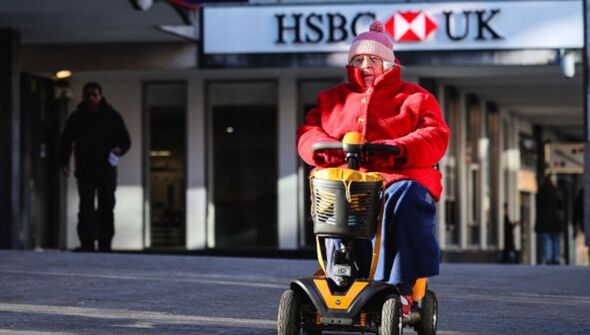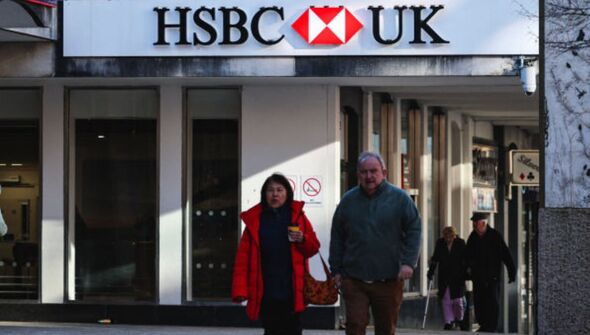
HSBC’s China losses have been branded a ‘black hole’ (Image: Getty)
HSBC’s troubles in China – which have seen it suffer a £2.4billion dollar hit – risk the UK-based bank being sucked into a “black hole” with clear implications for Britain, a tax consultant has warned.
HSBC last month said pre-tax profits surged by nearly 80 percent to top £24 billion in 2023, compared with £13.6 billion) the year before.
However, crucially, its pre-tax profit plunged by £3.3 billion to £800 million in the last three months of the year, compared with the same period the year before.
The fall was driven by a £2.4 billion loss linked to HSBC’s stake in Bank of Communications, a Chinese bank.
Mr Lyddon, the founder of Lyddon Consulting Services, told Express.co.uk: “They could be staring into a bottomless pit or a black hole, a situation that contradicts two decades of representations that China is the future.

HSBC’s problems in China could spell trouble for Britain (Image: Getty)
“How much do HSBC’s problems in Chinese real estate threaten the bank as a whole and its ability to support its UK customers?
“We simply don’t know. HSBC makes regular ad hoc adjustments to what it thinks its Chinese business is worth, the latest in its results for the fourth quarter and full year of 2023.”
HSBC had cut the valuation of its 19.03 percent stake in Bank of Communications (BoC) by £2.3 billion), or by 12.5 percent compared to year-end 2022, when it was valued at £18.4 billion, Mr Lyddon pointed out.
He continued: “This was a lot higher at the time than its market value: the 14.2 billion of shares it owns at CNY 4.53 each, divided by the CNY/US dollars exchange rate of 6.77, pointed to £7.5 billion – although HSBC itself stated the market value as £6.4 billion. Variations in value of 15 percent seem to be par for the course.
He continued: “Now it is being forced to recognise that there is a discrepancy between its valuation of its stake in BoC and the underlying business that BoC has transacted.
A £2.3 billion write-down is modest enough, but is considerably more than the £394 million write-down HSBC made on its direct lending in Q3 2023. Valuation principles seem to be as fluid as Chinese property prices.
“On December 31, 2022 ‘management concluded that no impairment was required’; on December 31, 2023 an impairment of £2.3 billion was taken.
“This is the worrying thing: management is confident in its valuations, opines that ‘China’s property market had fallen as far as it could’ and expects a ‘gradual recovery’, and then next time around the value of one of its channels into China gets marked down – but not all of them, and not using consistent and transparent standards for assessing the quality of the underlying business.”
The result was what Mr Lyddon called a “ratcheting-down of valuations, each one eating into the group’s equity”.
He asked” “And where is the bottom? Do the scale of the bank’s exposures into China threaten the group’s future?
“At what point does HSBC start to restrict or reduce its business in the UK because it no longer has enough capital keep it at its current level, let alone expand it?
“We simply do not know, and are made none the wiser by the bank’s Delphic utterances.”
Were HSBC to lose enough money abroad, it would begin having to cut UK lending to major corporations, done out of the global banking arm, Mr Lyddon emphasised.
He continued: “Next stop would be reducing the resources available to the domestic banking arm to the bare minimum needed to cover current business, depriving households and businesses of any new credit. Then maturing loans don’t get renewed.
“Without a circulation of credit the economy contracts. At the end of that line lies another type of RBS bailout: the government pays out UK depositors under the Financial Services Compensation Scheme and owns the bank…meaning a whacking addition to gross national debt (although the government would also own HSBC’s UK assets, including Silicon Valley Bank UK, whatever all that turned out to be worth – look what we are getting back for NatWest).
“Eventually the extra debt should be paid down via the sale of the assets but there is no certainty of amount or timing, and in the meantime our debt/ratio goes over 100 percent, kiss goodbye to any tax cuts and so on.”
Speaking last month, HSBC chief executive Noel Quinn said the bank remained “confident on the economy in China” and the fact that leaders were working to stimulate the economy.
He added: “I did say last quarter, I thought the market had bottomed. I still believe that.
“I also said last quarter that it would take a few years for the market to work its way through the current challenges – so I didn’t say the challenges were over.”
He further insisted there had been a “progressive and gradual recovery” in the real estate market.



